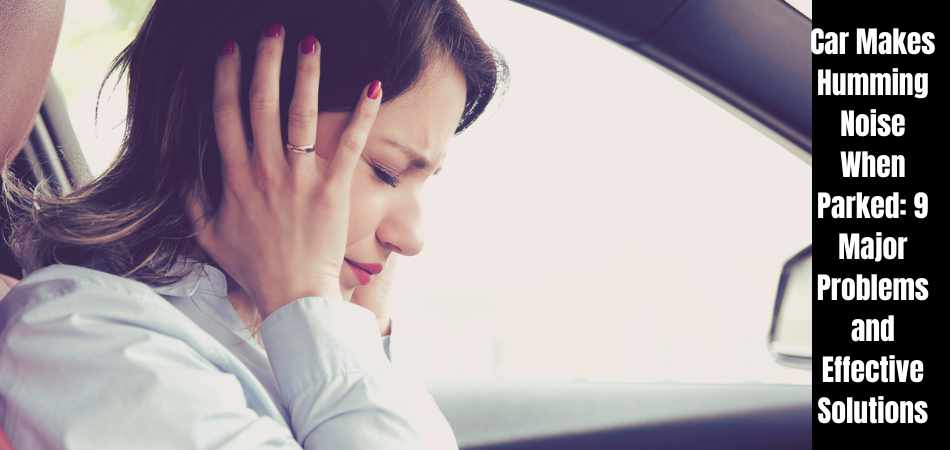
Cars generate all kinds of weird noises due to so many moving parts, fluids moving about, and different electrical components, many of which are normal and pose no cause for concern. However, sometimes you might notice that your Car makes humming noise when parked.
If you hear a humming noise when your car is parked, it could be the radiator fan, electric water pump, EVAP leak test, DPF regeneration, or a malfunctioning alternator. It’s the battery cooling system buzzing if you have an electric vehicle.
Read this comprehensive article explaining causes and solutions for why “your Car makes humming noise when parked.“
Is It Normal for Cars to Hum?
Cars create a variety of noises, and as long as you don’t hear any loud buzzing, metal grinding, whirring, clunking, or whining, there’s no need to call 911. Humming, for example, is one of the more innocuous noises you might hear in a car and is usually caused by the normal working of various components.
Humming Noise from Gas Cars When Parked
After parking in the garage for a few hours, you may notice a humming noise coming from the back of the automobile. That is the sound of the gasoline evaporation leakage test, and you should not be alarmed. The vehicle has an evaporative emission control system (EVAP), which seals the fuel system and prevents fuel vapors from escaping into the surrounding air.
When fuel vapors come into touch with air and sunshine, they produce smog, which is extremely damaging. The fuel pump is used to pressurize the vehicle system and test for leaks during the evaporation leakage test. Most cars are set to run this test after five hours of parking because every metallic will have contracted at that point, making it more straightforward to identify leaks. The check engine light on the dashboard will illuminate if the vehicle senses a leak.
Humming Noise from Electric Cars When Parked
Most individuals, including EV owners, are probably unaware that electric vehicles have a cooling system. Electric vehicles’ cooling system is needed to warm up the battery on cold days and cool it down because it is prone to overheating when in operation. The same is true for electric motors.
The cooling system employs ordinary coolant and a water pump to transfer the coolant. And the humming noise is caused by the water pump in conjunction with the coolant flow. The noise is significantly more noticeable in electric automobiles because there are no engine sounds, and what may confuse people is that the coolant does not circulate as frequently.
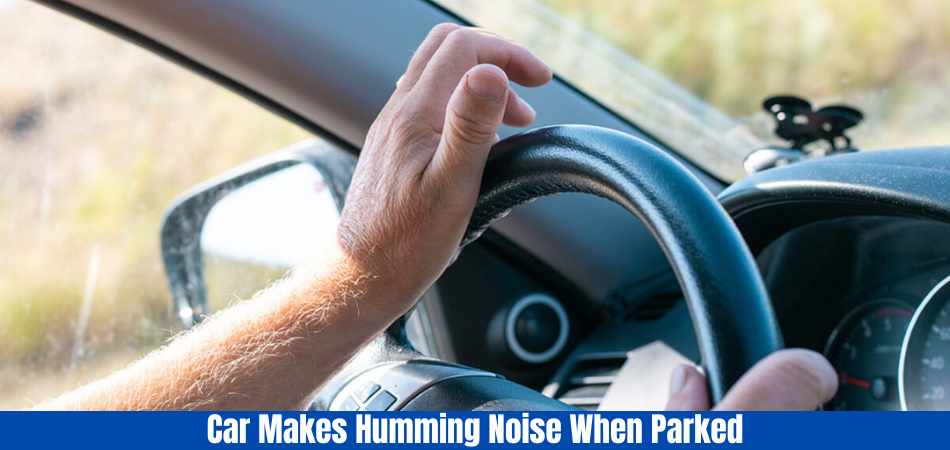
However, this is not cause for fear because if the battery overheated, you would receive a message, and if it were frozen, the same thing would occur. This precise explanation can also be found in your owner’s handbook; if not, it can be found on the dealer’s website.
Why Does a Car Make Humming Noise When Parked?
A car generates a humming noise when parked for various reasons, including electricity, fuel, AC system, brakes, inner CV joint, a faulty alternator, water pump bearing, transmission oil level, and tire balance.
Knowing the exact source of the buzzing sound is critical since it could indicate a serious problem that requires professional repair.
1. The electrical system
A weak or failing battery or a defective electrical component could cause a buzzing noise in your car. A buzzing sound might be produced when the alternator works harder than usual to charge a weak battery.
On the other hand, a short circuit or poor wiring in the electrical system can cause numerous components to create a buzzing noise.
2. The fuel system
When stopped, a car that makes a humming noise could indicate a significant problem with the fuel system. A faulty fuel pump could cause the noise. A buzzing sound might also be caused by debris in the fuel lines.
Other signs, such as difficulties starting your automobile or poor performance, indicate that the fuel pump needs to be changed.
3. System of air conditioning
Your car’s air conditioning system can potentially cause a buzzing noise in a parked automobile. When you switch on the air conditioner, the compressor or other system components may whine.
If your vehicle exhibits other symptoms, such as warm air from the vents or a weird stench, your AC system will likely need repair.
4. Brakes
If your parked automobile makes a grinding or droning noise, it could result from worn brake pads. A humming sound can be produced when the pads’ metal brushes against the rotors.
Other signs of worn brake pads include a pulsing sensation in the brake pedal and trouble stopping. The problem should be resolved by replacing the brake pads.
5. CV joint on the inside
If you hear a loud humming noise coming from your car, it could be due to a deteriorating inner CV joint. The inner CV joint is a component of the driveshaft that aids in the transfer of power from the transmission to the wheels.
Vibrations or unusual noises while driving are signs of a damaged CV joint. As a result, replacing the CV joint is frequently required to resolve the problem.
6. Alternator failure
A faulty alternator might also cause your vehicle to hum. The alternator is in charge of charging the battery and producing electricity for the electrical system.
If broken, it might cause shaking even when the automobile is parked. Dimming headlights or a dead battery are two other signs. The alternator must be replaced to resolve the problem.
7. Bearing for a water pump
If your car makes a constant humming noise when parked, it could be due to a faulty water pump bearing. To prevent overheating, the water pump circulates coolant through the engine.
Overheating or coolant leaks are signs of a failed water pump bearing. To resolve the problem, the water pump must be replaced.
8. Level of transmission oil
Transmission is poor. A low oil level or transmission problems might also cause the automobile to make noise when parked.
Symptoms of transmission problems include slipping gears, difficulties shifting, and a burning odor. Transmission repair or replacement may be required to resolve the issue.
9. Wheel alignment
A humming noise from your parked car could be caused by faulty wheel balancing.
This warning sign is usually more visible at highway speeds, although you may still hear it when the car is parked. Having your wheels balanced or rotated may assist to remedy the problem.
How to Identify the Source of the Humming Noise?
Understanding what’s creating a noise can help you determine where it’s coming from. Here are some measures you can take to figure out where the humming sounds are coming from:
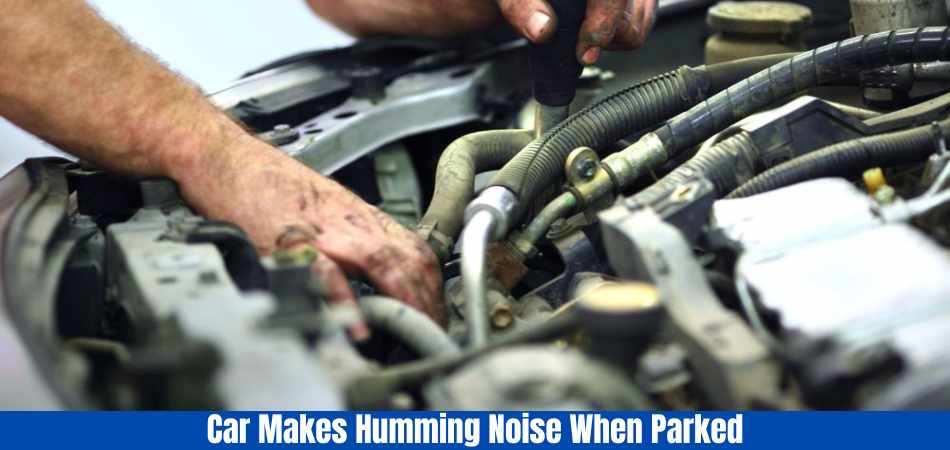
- Pay close attention: Start your car and let it idle for a few minutes. Determine where the noise is originating from. Is it louder behind the hood, or can you hear it better inside?
- Check Your Fluids: A buzzing noise might be caused by low fluid levels in the power steering or gearbox. Check to see if these fluid levels are low.
- Examine the Alternator: If the noise becomes louder when you turn on electrical components (such as your headlights or air conditioning), the alternator may be the source of the problem. A professional inspection may be required to validate this.
If the buzzing noise starts when you switch on your air conditioning, there could be a problem with the AC compressor. Again, you may need to consult with a specialist to confirm this.
Remember that determining the source of a noise can be difficult. Having a technician look at it is always a smart idea if unsure.
How To Fix The Car Making Humming Noise When Parked Problem?
If your car makes an obnoxious noise while stopped, it could indicate a more significant problem. Here are some potential solutions to the car buzzing when turned off problem:
1. System of electricity
A defective alternator or a weak battery might cause a continual humming noise. You may need to replace or repair the faulty component to resolve this.
If there is a short circuit or defective wiring, a mechanic must diagnose and repair the problem.
2. Fuel system
A humming noise caused by a clogged fuel filter can be resolved by replacing it or by a professional.
Check the fuel system and consult a mechanic if the fuel pump is the problem.
3. Air conditioning system
A standard automobile noise from the air conditioning system can signal a compressor problem or a loose belt. Bring your vehicle to a repair shop for a diagnosis.
4. Brakes
Humming or clicking noises might be caused by worn brake pads. To correct this, you must replace the brake pads. If the rotors are damaged, they may also need to be replaced.
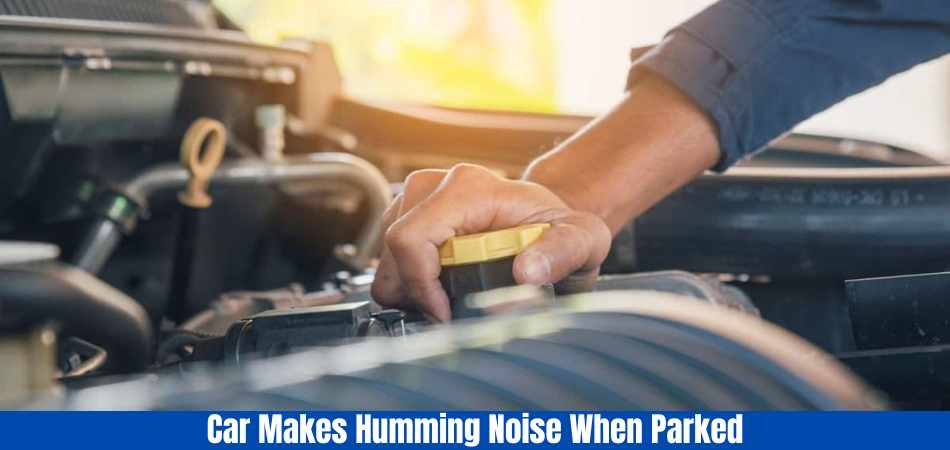
5. Wheel Bearings
A professional should replace worn wheel bearings if they are causing common automotive noises.
Driving with worn-out wheel bearings can cause major damage to your vehicle, so it’s critical to solve this problem as soon as possible.
6. Regular upkeep
Regular maintenance eliminates humming noises and keeps your automobile running smoothly.
Routine maintenance, including oil changes and tune-ups, can help prevent problems before they become major concerns.
7. Other elements
If none of the aforementioned alternatives work, there could be other underlying concerns. A specialist can identify the issue and advise you on the best action.
Taking your automobile to a competent mechanic and treating any faults immediately will prevent future damage and guarantee your vehicle works smoothly.
What are the Other Strange Noises from Your Car, and What Do They Mean?
1. Droning sound
The car can make droning noises when the tires are in poor condition. It gets more noticeable when doing corners or speeding. Tires are a vital component of every vehicle. A new pair of tires will always provide a smooth ride on the road.
2. Squealing Noise
The front end of the car occasionally makes a squealing sound. As soon as you start the vehicle, the sound becomes noticeable. The serpentine belt is the primary source of the squealing sound. The belt passes via several pulleys and wheels. It can even run on the compressor, alternator, or pulleys of the car.
After repeated use, the belt might become damaged, resulting in a screeching sound. So, if you hear such a noise, immediately inspect the belt. If you do not do this, the belt may fall off the compressor or alternator, causing the air conditioning to fail. The car may even halt in the middle of the road at times.
After hearing this noise, please inspect the tires. If the tires are underinflated, you must inflate them if you suspect feather tires (treads that have worn out and are no longer harmful).
3. Rattling sound
While driving over potholes or bumps, you may hear rattling sounds from the car. Several things are going on in the vehicle’s front end. Aside from the engine, the car’s front end has a suspension system with several significant components.
Worn bushings can cause a rattling noise. A bushing aims to dampen vibration, reduce noise and friction, and absorb road bumps. Rubber is used to make these bushings. However, they can be shattered with time, resulting in a rattling sound from the car.
However, other reasons may be, such as worn struts, ball bearings, or sway bar links. It’s difficult to isolate the components causing the rattling sounds. When the automobile is in the parking position, you can do a bounce test at home.
Firmly press down on the vehicle’s front end. It may not tell you which bushing is faulty, but it will tell you whether or not the suspension system is to blame for the rattling sound. Take your vehicle to a local repair if you hear the noise throughout each bounce test.
4. Whining or Squeaking Sound
Low-power steering fluid might generate squeaking, groaning, or whining when rotating the steering wheel. To function correctly, the power steering system in older vehicles requires fluid. When the fluid level drops, turning the steering wheel becomes difficult. You may also hear squeaky or whining sounds. You can resolve the issue by topping off the power steering fluid reservoir.
Other factors could exist as well. For example, if the power steering pump fails, air might enter the lines and cause squeaking or whining.
5. Growling or screeching
If you hear a screeching or growling sound when you step on the brakes, there could be a problem with the car’s brakes, which is unsafe. Brakes are an essential component of any vehicle. The brake pads have worn out if the automobile makes a lot of noise when you step on the brakes.
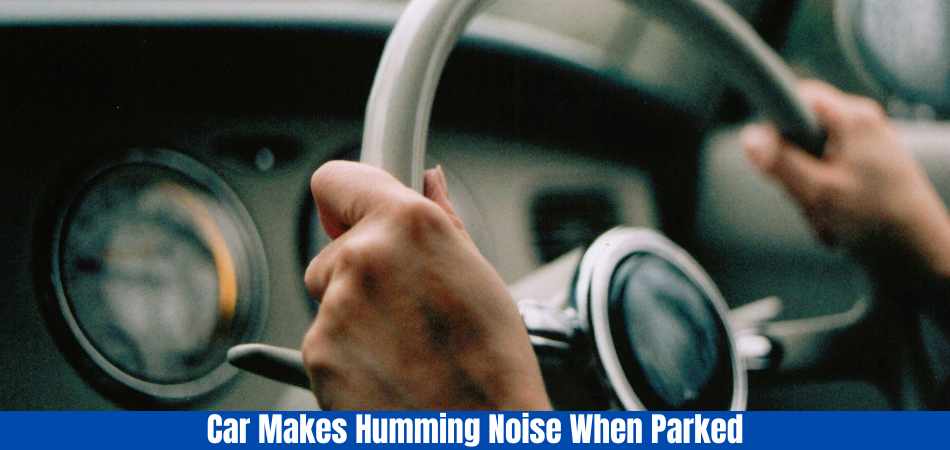
However, if it makes a tiny screaming or growling noise when you step on the brakes, the brake pad is deteriorating, and the caliper is grinding on the rotor. In both circumstances, the brake pad must be replaced.
6. Loud Bang
Hearing a loud blast from the back of the automobile, akin to a firecracker or gunshot, is rather alarming. In most situations, the cause is an insufficient mixing of air and fuel in the combustion chamber. More fuel and less air in the chamber can result in a loud bang sound.
There could be other factors as well. For example, there could be a problem with the sparkplug. Hearing such a loud bang implies that the engine is working well. The car’s exhaust system may be irreparably ruined if you don’t address the problem immediately. As a result, we urge that you take the car to a qualified auto repair shop immediately.
7. Rumbling
You may hear a rumbling sound and feel vibrations when the vehicle is idling. It suggests several probable explanations. An improper air-fuel combination in the combustion chamber could cause this problem. Fuel injectors might become clogged over time and no longer give adequate fuel to the combustion chamber.
Furthermore, if the air filter becomes clogged, there will be no oxygen in the chamber. You may fix it by replacing the air filter.
Occasionally, the oxygen sensors fail over time, which could explain the rumbling sound. There could be a problem with the spark plug. A rumbling sound will be heard if the sparkplug does not consistently burn the air-fuel mixture.
8. Knocking
A knocking sound may be heard from the car’s engine hood. When the fuel inside the combustion chamber burns simultaneously, the engine runs properly. However, a banging sound is produced if the fuel does not burn simultaneously. Using low-octane fuel, you may occasionally hear a knocking sound from under the hood.
Sounds like the washing machine is on high spin.
If you are on the road and hear a sound from a vehicle, such as a washing machine running at high speed, the problem is severe. The lug nut may be loose, indicating the car’s wheels are not correctly attached. So, take the vehicle to the nearest repair as quickly as possible.
9. Roaring sound
While speeding, you may hear a roaring sound. There could be several explanations for this. For example, if there is a problem with the catalytic converter, you will hear such a sound.
All the exhaust gasses are normally sent through the muffler, reducing the roaring sound. However, if there is a crack in the exhaust system, the gases will escape before reaching the muffler, resulting in a roaring sound.
When to Consult a Professional Mechanic?
While some automotive problems can be resolved at home, there are instances when you should take your vehicle to a professional technician. Here are some examples of when you should seek expert assistance:
- Unsure of the Noise Source: If you’ve tried to locate the source of the humming noise but are still unsure, a mechanic can assist you. They have the skills and experience to swiftly and reliably identify noise sources.
- Sophisticated repairs: such as changing an alternator or a transmission, necessitate using specialist tools. If this type of repair is required, leaving it to a professional is preferable.
- Persistent Noise: A mechanic can assist if you’ve attempted to resolve the issue, but the humming noise persists. Sometimes, the problem is more intricate than it appears.
Final Thought
When your automobile is parked, a humming noise can indicate various problems, ranging from power steering troubles to a broken alternator. While determining the noise source can be difficult, the problem can be identified and resolved with the appropriate methodology.
Remember, if you’re unsure about a noise your automobile is making, you should always visit an expert.
Read more of our articles here.
Read Also: Common Car Noises and What They Mean.
FAQs
Can Tires Cause Your Car to Hun?
Technically, tires produce a buzzing noise that increases in volume with speed, but it sounds similar to wind noise and does not draw your attention. Other components, such as the radiator fan, AC fan, and electric water pump, can hum under specific conditions.
How Can I Make My Electric Water Pump Quieter?
There is no method to reduce electric water pump noise as long as the engine and cooling system are operational. However, suppose the water pump becomes louder than usual. In that case, you should have your cooling system serviced because the automobile could suffer from a faulty water pump, insufficient coolant, or air trapped in the system.
What Is the Noise of a Faulty Radiator Fan?
A functioning radiator fan generates a humming or high-speed wind noise. On the other hand, a malfunctioning radiator fan can generate a grinding noise, indicating that its bearing is worn out, or a whirring noise, indicating that one of the fins is broken or vibrating owing to a damaged bearing.
What temperature causes the radiator fan to activate?
The engine determines the temperature at which the radiator activates. This can be 180°F (83°C), 200°F (95°C), or even 230°F (110°C). Keep in mind, however, that the coolant temperature at the radiator fan switch is not the same as the coolant temperature sensor, which provides data to the dashboard temperature gauge.
What Does a Failing Alternator Sound Like?
A failed alternator might produce a grinding or low-frequency humming noise, suggesting that the bearing is worn out, or a buzzing sound that increases with engine speed, indicating the faulty voltage regulator. If the alternator bearing seizes, you will frequently hear the belt screeching.







Leave a Reply